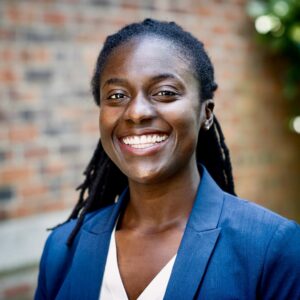In this Vital Signs series, we feature 4th-year UNC School of Medicine student Charlene Brown. From Woodbridge, VA, Charlene’s journey into medicine began through offering spiritual guidance and emotional support as a hospital chaplain.

4th-year UNC School of Medicine student Charlene Brown has the aspiration to be a urological surgeon. She shares more about her passions and what she loves most about attending medical school at Carolina.
Q. What interested you the most in high school and college? Did you always want to be a doctor?
For as long as I can remember, I have been captivated by how suffering and grief shape the human experience. This passion led me to pursue a major in Religious Studies at the University of Virginia and subsequently earn a Master of Divinity from Duke University. Driven by my experiences and these profound questions and ideas, I committed myself to a life of service and advocacy. My journey began as a hospital chaplain, where I had the privilege of supporting individuals through some of their most challenging moments, including death, divorce, illness, and grief. These moments were balanced by the joys of life like births, weddings, and recovery. I later took on the role of National Director for a large faith-based non-profit, where I had the opportunity to lead critical diversity and equity initiatives, while mentoring first-generation college students nationwide, empowering them to become leaders and agents of change in their chosen vocations.
Q. Why did you choose to become a doctor?
Although I had briefly considered a career in medicine, I lacked role models in my early years. I found myself grappling with questions of my own, as I walked alongside others discerning their futures. I started volunteering as an EMT on weekends and completed a post-baccalaureate program. As I seriously explored medicine, I realized my experiences had and would continue to shape me into the doctor I wanted to be. Along the way, I had picked up skills in listening, empathy, and compassion. I had learned advocacy and grit. And most importantly, I was learning to inhabit that profound and beautiful intersection between faith, suffering, and medicine, providing compassionate and holistic care for patients and their families.
Q. What is the most interesting part of medical school at Carolina?
I had many experiences during my third year that shaped my vision for what kind of doctor I wanted to be. I enjoyed seeing patients in clinic and loved procedures. But most nights, I dreamed about returning to the OR. An open radical nephrectomy alongside urology resident, Yousef Abu-Salha, became a defining moment. It was a beautiful, fascinating, and satisfying procedure. Alongside attendings, Yousef took the time to teach inside and outside the OR. He showed us tips and tricks, as we honed our technical skills. And he made sure we gave every encounter our best effort. Thankfully, Yousef is incredible, but not an outlier at UNC. I have immense gratitude for the many incredible residents, attendings, and staff I’ve learned from during medical school.
Q. What do you plan to focus on after med school (residency in what and where)?
I matched at the University of North Carolina in Urology — excellent surgical training, teaching, and innovation, as well as an environment of respect, camaraderie, and collegiality. I am thrilled to be staying home and joining this department.
Q. What is your career goal?
First, I want to be an excellent urological surgeon. I love the integration of technology and robotics in the field. I love academic medicine, have a passion for teaching and leadership. I love the scope and variety of surgical and medical management options available to us and the tangible differences we can make in our patients’ lives. And I love the diversity of our patients, ages 0 to 101.